Category — Features
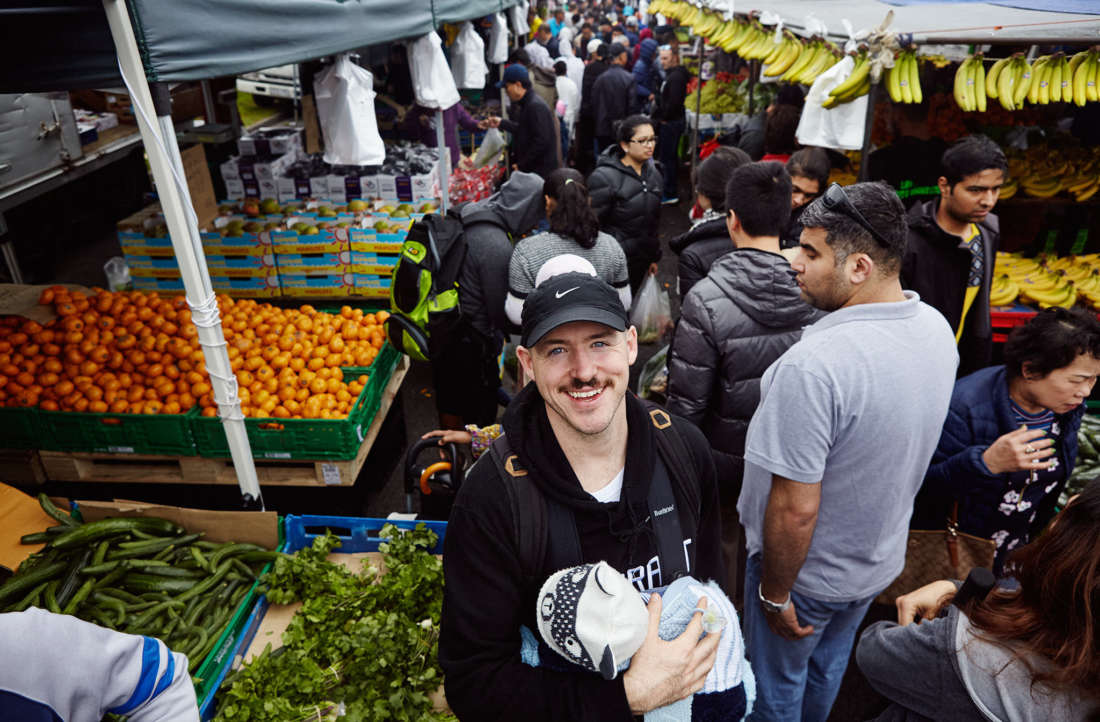
Flat whites and white flats
Avondale, originally called Te Whau, is famous among food lovers for its Sunday market, and in fact was the site of early Auckland’s market gardens. I recently visited Avondale old boy Tom Scott of Homebrew, @Peace and Average Rap Band fame.
Tom’s music is full of cultural and social observation, so I was eager to pick his brain over coffee at his local, Salvation Kitchen; about how the working class community he grew up in has inspired his forthcoming album, and about the place of food in his life and the lives of those who surround him. But not before he put a shovel in the ground in his backyard to proudly reveal rich loamy market garden worthy humus that left this urban farmer very envious and contemplating a move.
“my tastebuds are riddled with nostalgia”
Tom is usually interviewed about music, the planet around which he orbits, so the first thing he said to me was, “I don’t really know much about food.” But he soon revealed that his father is an adventurous eater who schooled him to be inquisitive too. “He’s like a 65 year old hipster, he’s always been a bit of a weirdo, forcing me to eat chicken feet when I was young, to try different things. I guess that was my introduction to food from outside mum’s kitchen.” But Tom’s palate is also a byproduct of the people he grew up around, exposed to Samoan and Maori food he says, “My tastebuds are riddled with nostalgia. I always like to go back to that food, so it’s cool to be back in this neighbourhood”. Surrounded by shops with stacks of taro and coconut piled high at the front door and where $6 will get you a generous helping from the bain-marie at the Samoan cafe where we later stop for Sapasui (chop suey), chicken curry and taro.
Tom’s been out of town for a while, leaving the country as so much of our talent does, to swim in a bigger pond, get out of his comfort zone, see the world. But heading home to start a new family he made a beeline straight back to his old hood rather than into suburbs many of us assume to be more dynamic or cosmopolitan, which says quite a lot. So why Avondale? “It’s just got soul man. I don’t even know how to explain it, it just feels right. Coming back to New Zealand was one thing, but coming back to Avondale felt like the true homecoming. There’s no place like it, because if you take a handful of people you won’t find two of them alike. It sounds so cliche because people use it to buy likes these days, but there’s a lot of diversity. I love this place.”
Stone Soup looks at the world through food, and we’re keen on getting a scoop on a cheap eat off the beaten track. Avondale is only a couple of stops on the train from Central, there are gigs at the rejuvenated Hollywood Cinema, so the first thing I wanted to know was are there any undiscovered spots we should know about? “There’s definitely authenticity,” Tom insists, “If you want Indian food, it might not have the greatest hygiene rating, but right there is real Indian food cooked by Indian people and next door there’s a Japanese spot run by Japanese people. It’s legit. And if you want to cook, you can grow veggies in the backyard. The soil is fire.” Sandringham and New Lynn also straddle Avondale so there is some pretty solid flavour within striking distance.
Tom reckons authenticity is ultimately what we’re all after, whether we’re “musicians, foodies, or movie critics, we all actually want the same thing,” he proclaims, “that’s exactly why things get gentrified, people get bored with Ponsonby and want something new, because the soul of it has been diluted. ‘We’ve done this, we’ve eaten all the fruit off this tree, so we gotta go look for a new tree.’ And they come to places like Avondale or any other place in Auckland or the world that has been gentrified, looking for that fresh fruit. They want that grit, they want authenticity again.”
But undiscovered cheap eats a few stops from town isn’t the real food story of Avondale, Tom and his friends grew up eating from places like local institution Green Jade. “We’d wash window screens up the road, come down with the money and buy a quarter chicken, or a massive feed of fish and chips covered with tartare and tomato sauce, and bread from the dairy next door to put the chips in.” Tom points to Green Jade and laments that he sees, “family after family going there for those $2 hamburgers,” and expresses sadness that, “the food most working class people can afford, it ain’t good for you. But what are you gonna do? That’s just how everyone grows up here, on shit food.”
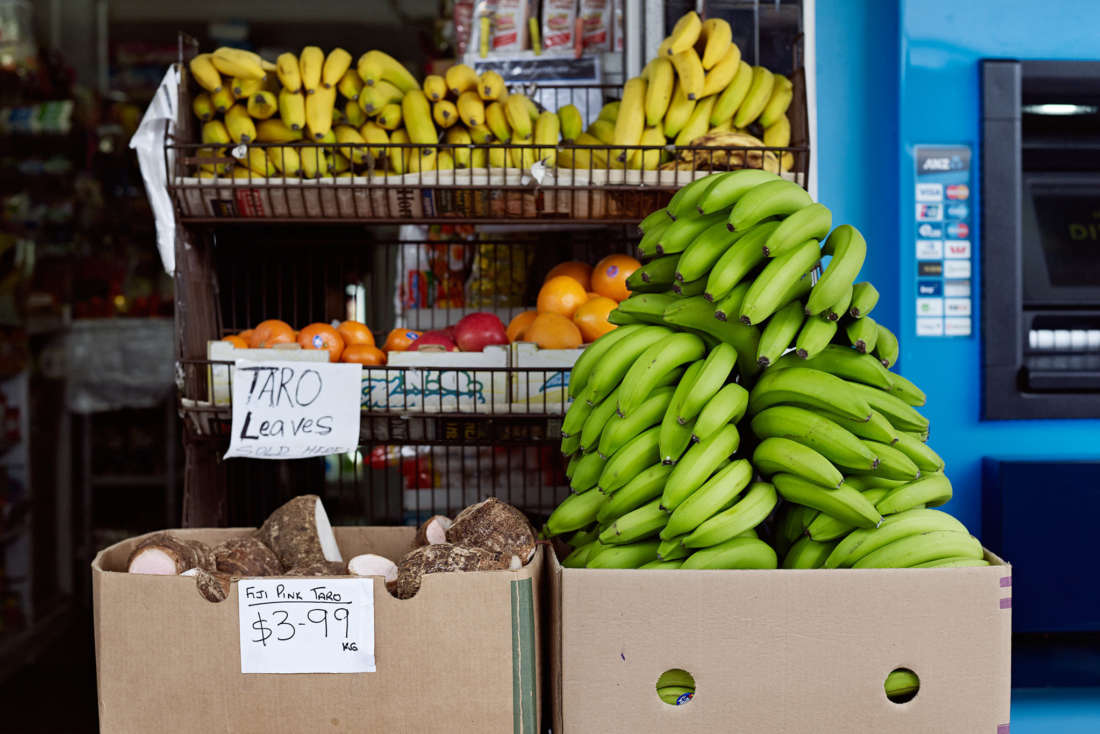
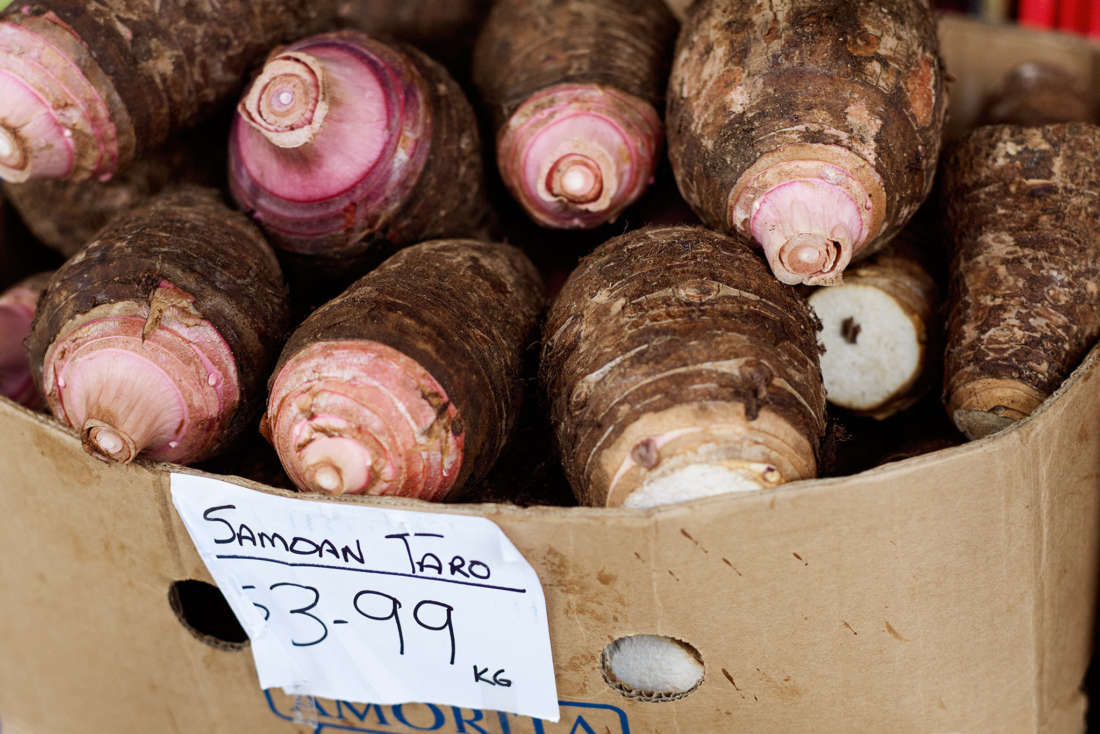
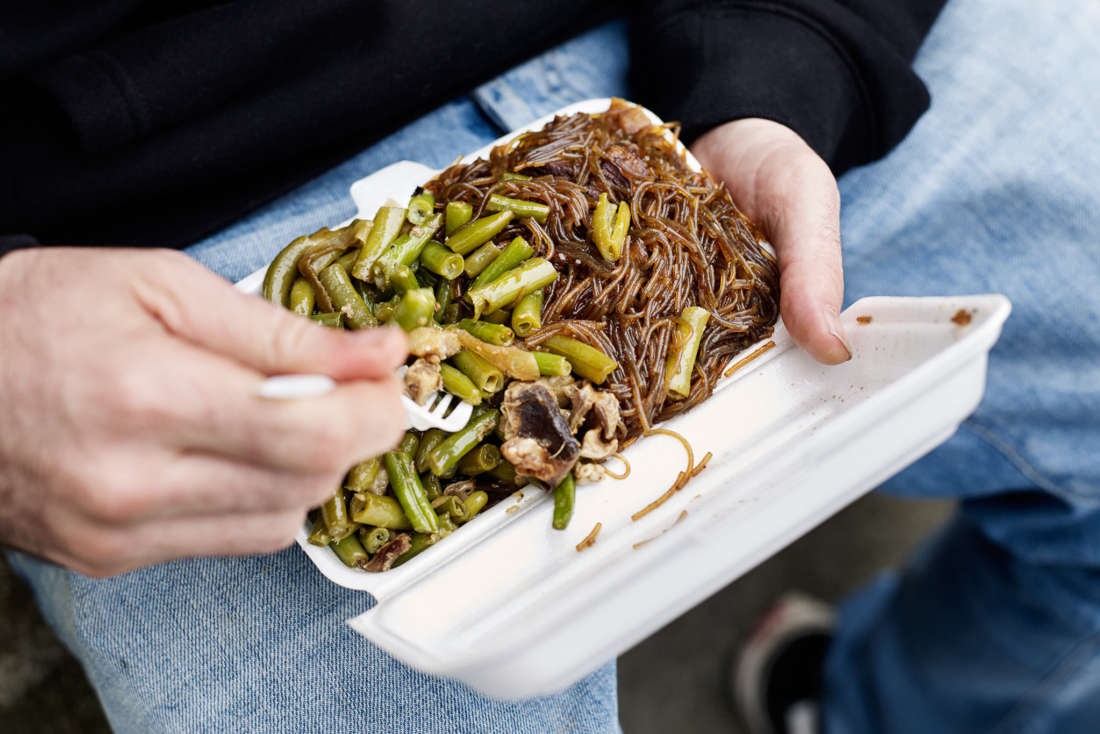
“If there’s a Ray White or a white Ray, you’re screwed.”
Many people who love good food would presume the arrival of nicer eateries in a neighborhood is a sign of things getting better, and there are a few nice spots starting to pop up, but is it actually a canary in the coal mine for those who have lived here for generations? “Yeah, flat whites and white flats. It’s like a lump in your breast that you haven’t really acknowledged, you can smell the cancer but you just don’t want to admit it. If there’s a Ray White or a white Ray, you’re screwed.” He doesn’t like seeing local businesses being shut down, like Burger Queen, a few minutes away on Mt Albert Road, “I think they got pushed out by their landlord,” he surmises, “they used to let everyone tag on pieces of paper and put them up on the walls and some of the burgers were named after dinosaurs. It was brilliant, but yeah…it’s gone. To me, that was the best burger place in town.”
So has he returned to the Avondale he grew up in? Are his neighbours changing as well as the eateries? It’s hard to say, “because at the same time as I see that white Ray walking to the coffee shop, I still see people selling weed outside the $2 shop.”
Tom admits to liking good baked eggs as much as those colonising his hood, and acknowledges that gentrification can be an unfortunate byproduct of good intent. “I do like that Hare and the Turtle place — they call that New Windsor now which is funny because it was always Avondale — that place is decent,” he says, “It’s young people and it’s affordable”. It’s an inevitable but irreversible evolution in a city, young people coming up want to start a business, “and they can’t afford to do it in Ponsonby where their market is, so they set up where they can afford the rent and accidentally bring their market with them.” Tom even has dreams of adding to Avondale’s culinary landscape himself by opening a juice shop. “But at the same time,” he says, “I’m scared that I might be low-key gentrifying it. Even when I talk about Avondale in articles like this or in my music I’m scared I’m low-key gentrifying it.” You can’t blame people though he concedes, for seeking opportunity, “to want to be involved in a community. But I guess once those people come — artists and cafes and so on — it increases the value of the place, and then people from here can’t afford to live here, I can’t afford to own a home here and I’ve lived in Avondale my whole life. My Dad can’t afford to live here.”
Tom has a dream to stay in Avondale but he’s scared that by the time he can afford a house he’s, “gonna look up and everyone’s gonna be gone. And the thought of people that are from here not being able to live here, that’s what pisses me off bruv, cause I’m alright, I’ll survive.” Tom’s got a good hustle, a self proclaimed anomaly, but he recently had an experience that highlighted the reality of many who surround him and brought tears to his eyes to recall. “The other day we visited this house, there was like, twenty three of them living in it, the bed had no fucking mattress, the parents had passed away, the kids were fighting like you would if you were all stuck in one cage. Just young, troubled youth that have been through a whole bunch of shit, and just to think that people that deserve a roof can’t have one, that cuts me up. I said it in a song, ‘nothing’s changed since the days of the lord and the peasant, nowadays they just call them landlord and a tenant’. I want my own house, I feel like that would be a freedom.”
“the food that brings you together, but the real nourishment is being together”
But Tom is not low-key gentrifying Avondale, since his return he has decided to get involved at ground level. After being contacted by Dayne Smith, co-organiser for the Together We Are Avondale initiative and responsible for Instagram account @iloveavondale, he started going to the community centre to help with an initiative called Feed the Streets, where he first met one of the twenty three kids living in that house. Tom says he wanted to be proactive in the community but didn’t know how, so this seemed to be the perfect way to engage. “When I first turned up (he rubs his hands together acting enthused and ready to dig in) after setting up the tables, at a loose end, he asked, what’s next? “Dayne said, just sit and talk with them, and to be honest, that’s the most helpful thing you can do. You all share this meal, and it’s the food that brings you together, but the real nourishment is being together, isolation is what kills you. I think people can get food most of the time, but dignity, just being on the ground looking up, what that must do to your mind state”. Tom laments that homelessness is rife in Avondale and the Council has put in place a policy of no begging, so initiatives like Feed the Streets are critical to people’s food security and sense of dignity. “I love that Ricky Gervais joke,” he sums up, “where he tells God ‘I gotta get money’ and God is like, ‘what’s money?’, ‘You know, money,’ Ricky explains, ‘you need it, to buy food,’ and God is like, ‘fooooood? I left it on the floor!’”.
The paradox of course is that the neighbour of this food insecurity is a poster child for a better food system, a well attended market of small holders truly representative of the diversity of our city. Avondale Market was founded in the seventies and every Sunday as many as 20,000 hungry Aucklanders — outsiders and locals alike — feed themselves from its abundant stalls. “I always went there as a kid,” says Tom, “I went with my Dad, but mainly with my friends. We’d just go for something to do, for mischief. But now I go every Sunday to get my food. It’s fresher. You can see the difference between the food at the market and what you get at Woolworths or Pak ‘n Save, and it’s like supporting the local tinny shop instead of the pharmaceutical companies or the gangs. But I don’t go just for food, I also go because it feels good.”
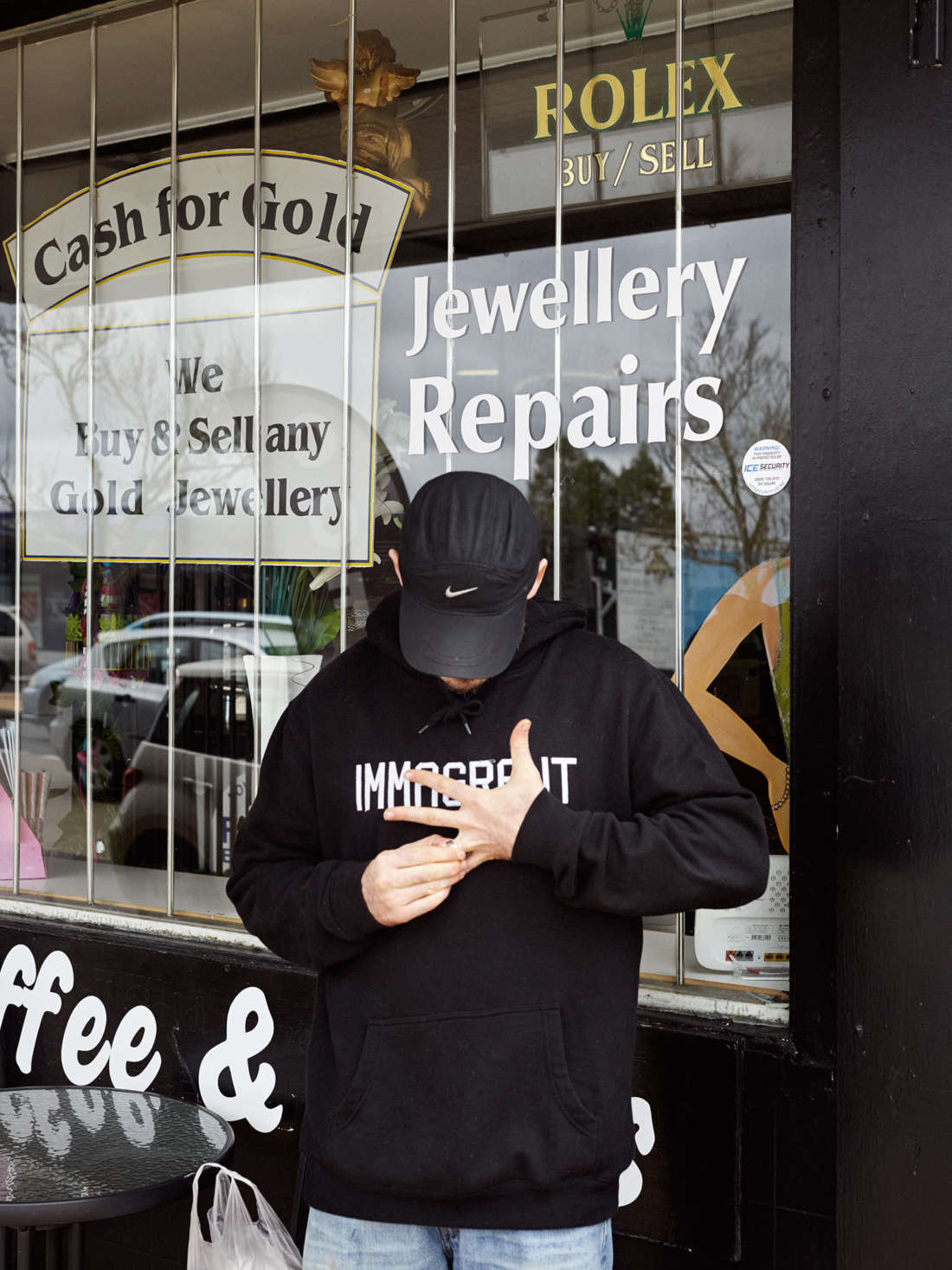
Tom is soon to release a long awaited album Avantdale Bowling Club, which he started recording in Melbourne to document his life there. But coming home he says he discovered he had much more to say, he “found a more universal struggle” with a fresh perspective on Avondale “the struggle of working class people, not just the struggle of an artist.” Hip Hop is the poetry of the street the world over, it’s folk music, but often we as listeners are better versed in the struggles of those who inhabit Compton, the Bronx or Atlanta than we are about the neighbourhoods in our own backyards. “I want people to understand and appreciate the people of this neighbourhood,” he says, but he also wants to describe the struggle of the middle class. “When I wrote the Homebrew stuff,” he explains, “I was trying to tell the story of friends involved in gangs and in prison, that grew up without fathers, with a real level of struggle. But now shit has got so bad that even people that have education or have been trained as tradesmen can’t survive here. I have a friend who’s an electrician, works his ass off, and is leaving because he can’t afford to live in Auckland anymore. That’s the new struggle that I’ve felt more than ever being back here, that’s what I want to say with this album.”
Avondale is a microcosm of the complexity and contradictions of Auckland life, of the gentrification driven by our housing crisis and the food system which fuels us. It has become an dynamic culinary city and it’s easy to get excited by the next new spot you want to check out, but that’s not our whole food story. We need to make sure we take some time to contemplate and acknowledge that eating out for many is an exclusive pursuit, and for some an impossibility. Look out for Tom’s album, get some local flavour on your car stereo and head to Avondale one Sunday, for a bit of that fresh produce and vibrant multiethnic energy. And to inject a bit of cash into this melting pot on Auckland’s city fringe, head to main street to pick up a polynesian picnic mat, a feed of Sapasui and coconut water that doesn’t come in a tetra pack.